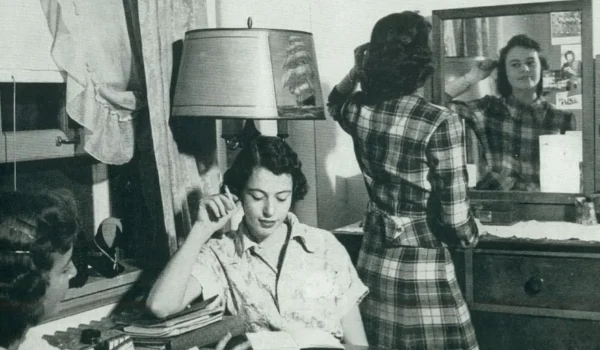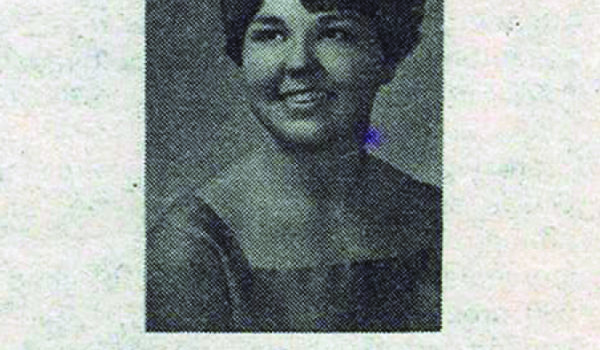A Journey of Mortar Board, Inc. and Title IX – Full Version
By: Catherine Nelson Evans (Texas Tech University, 1957) - Mortar Board National President from 1973-1976
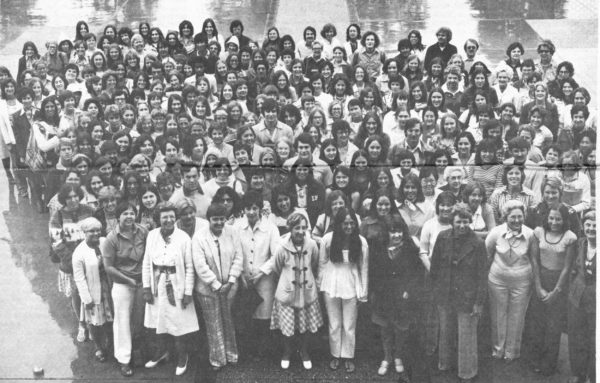
The 1976 conference featuring the first male delegates
Mortar Board Inc. began an unexpected journey to an unmapped place on June 23, 1972, when the United States Education Amendments to the Civil Rights Act were signed into law by President Richard Nixon. The amendment was simply known as Title IX, but for Mortar Board it was a crossroads thrust upon us.
The amendment stated: “no person in the United States shall, on the basis of sex, be excluded from participation in, be denied the benefit of, or be subject to discrimination under any educational program or activity receiving federal financial assistance.” The statement was brief and legalistic. In early questioning we learned that specific language and clarifications would be articulated in the regulations. The Department of Health, Education, and Welfare (HEW) would be in charge and their Office for Civil Rights (OCR) was responsible for enforcement and implementation. Then we began what I called in a report, “groping in the dark.” However, we were aware in the following academic year that some Universities were preparing to implement the Amendment.
Mortar Board’s 22nd Triennial Conference in June of 1973 was held in “an exciting time to be woman” as labeled by women in higher education. To give a little context for this Conference, the Equal Rights Amendment to the Constitution was passed by the Senate and House in March of 1972. Twenty-two state ratifications the first year and eight in 1973 were pushing it along rapidly. Mortar Board was responding to this “exciting time” by having different Conference workshops for delegates such as automobile repair. We presented the first Mortar Board National Citation for a prominent woman to Congresswoman Martha Griffiths who had been closely involved with the passage of the ERA.
Above all, however, we acknowledged the potential seriousness of Title IX for Mortar Board, Inc. We made a concerted effort to acquaint Mortar Board chapters with the issues involved in our single-sex status. The delegates were addressed by our attorney, Mr. Huntington Carlile, regarding Mortar Board’s legal jeopardy under Title IX. The current President of Omicron Delta Kappa, a national male honor society, spoke to the Conference regarding a potential merger. The issues were fully discussed and the Membership Options Standing Committee stated: “We believe that Mortar Board is an organization dedicated to recognizing and supporting outstanding collegiate women in areas of leadership, scholarship and service. Maintenance of our status is justified for the following reasons: an organization is needed to recognize the unique qualities of women and their preparation for societal responsibilities, emphasizing leadership roles, and to act as a vehicle for women to develop their potential as women. Mortar Board also serves the needed function of acting as a forum for discussion of women’s concerns and providing the opportunity for friendship and interaction with other women.” The result was a unanimous decision by the delegates to retain our single-sex status and affirm our purpose to be concerned with the status of women in the college or university and the community of which each chapter was a part. As the newly elected President of Mortar Board, I was acutely aware of the task mandated by the delegates to the 1973 Conference.
The year following the Conference was spent attempting to ascertain the implications of Title IX for each Mortar Board chapter. I began by contacting the Regional Office for Civil Rights, Department of HEW, in Dallas, Texas. I was told the proposed regulations were imminent, but the magnitude of interpreting the law made it apparent that the regulations were proving to be difficult to formulate. It was also made very clear to me throughout our conversations that Mortar Board “would not be exempt because of its rather close affiliation with universities.” The Regulations were published in proposed form in June of 1974 and appeared to threaten Mortar Board’s status as a recognized campus organization. I immediately contacted Ms. Gwen Gregory in the Office for Civil Rights in Washington, D.C. since Ms. Gregory reportedly had been the prime author of the Regulations. While not a member, she attended the University of Denver and was familiar with Mortar Board. She expressed regret at the impact this would have on Mortar Board but she felt there was no other alternative under terms of the legislation. She informed me about the Regional Hearings regarding the proposed Regulations, and we began immediately to obtain representation at every Hearing but the first. One of our primary questions regarded Subpart D, Section 86.31 which stated that an institution of higher education may not support or assist any organization which discriminated on the basis of sex. I have a copy of a Q&A on July 24, 1974, in St. Louis that related to Mortar Board. It includes two quotes from Gwen Gregory in response to questions by a Mortar Board student advisor: the first question was how you define “assistance” by the institution. Ms. Gregory said “it may be regulations by their very nature are not maybe as specific as we would like for them to be.” However, she then defined assistance broadly as meeting space and faculty advisors. In answer to the second question, Ms. Gregory defined a time allowance for compliance to the Regulations by stating: “I would say that if organizations now feel that a reasonable reading of the Regulations would put them in hot water as it were, maybe they ought to start thinking right now about what they plan on doing.” We were, and continued to do just that! I regularly made trips to the OCR Office in Dallas to read the Minutes from the Regional Hearings. They gave me a room the size of a closet to read through all the Hearings. It was a long, tedious project.
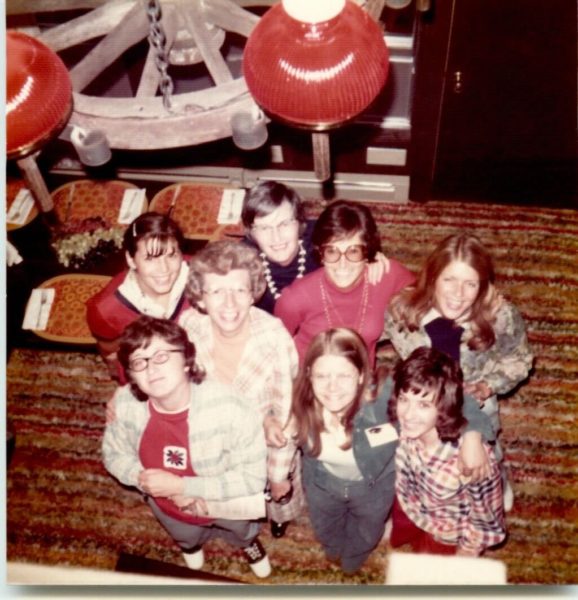
July 1974 meeting and Title IX working session.
The July, 1974 meeting of the National Council, Region Coordinators, and Student Advisors became a Title IX working session. A committee of Region Coordinators presented their report, and the future actions of the organization were debated at great length. The final decision was to (1) submit comments regarding the proposed Regulations to the Office of Civil Rights (OCR) pursuant to their request, comments to be drafted by Mr. Carlile with my assistance; (2) explore the possibility of special legislation; (3) develop a Position Paper to be distributed to all chapters and alumnae clubs; and (4) send a letter to each institutional President with a Mortar Board chapter. The decision to follow the above course of action was heavily influenced by the definitive mandate of the 1973 Conference that Mortar Board should remain a single-sex organization.
The remainder of the summer was totally consumed with Title IX and an effort to assess congressional sentiment regarding special legislation to exempt Mortar Board. I had a personal meeting with Senator Lloyd Bentsen Bentsen (future Democratic Vice-Presidential Candidate and Secretary of the Treasury) and his policy aide, thanks to a Mortar Board member who worked in his office. Senator Bentsen, along with Senator John Tower, also from Texas, had previously been successful in getting exemptive legislation for Greek organizations. I was hopeful he would be supportive of our proposal based on his previous efforts. Senator Bentsen was apologetic, but very clear that the political environment changed dramatically after the ERA Constitutional Amendment had passed Congress in March of 1972. As a result of the new landscape and the earlier legislation he had obtained, he did not think he could assist with exemptive legislation for Mortar Board. I still kept appointments with aides of Senator Tower and my local Congressman. They offered support, but advised me to submit comments and letters to OCR rather than attempt legislative solutions. It is worth noting that the week we were in Washington the Supreme Court handed down its decision to force President Nixon to submit the White House tapes. To say everyone was a little distracted does not suffice! As I sat in my Congressman’s office discussing Title IX, my family was on the steps of the Supreme Court when the decision came down.
We now turned to preparing our comments for the Office of Civil Rights. I still have a carbon copy of it that is an indicator of the level of communication we had in 1974. Future contact with congressional people was not successful. With the assistance of National Council and other people knowledgeable about Title IX and its ramifications, I prepared an official Position Paper on Title IX that was distributed to chapters and alumnae clubs. This paper appeared in the September issue of the Forum. The official Comments prepared by Mr. Carlile represented the organization well both legally and philosophically. These Comments included personal letters from chapter and alumnae club members. We learned unofficially that the OCR/HEW received more mail from Mortar Board than any other single-sex organization.
During the academic year of 1974-1975, only a minimal number of Mortar Board chapters were affected by Title IX. It was assumed that most institutions were waiting for the release of final Regulations before questioning Mortar Board’s status. Problems did arise during the year for five schools, and were dealt with by the 1st Vice President and myself. On the Federal level, I continued to make every effort to stay well informed regarding the future of the Regulations. Correspondence was extensive with Representative Edith Green (Oregon) who was chair of the Subcommittee on Higher Education and Senator Birch Bayh (Indiana) regarding exemptive legislation. I continued conversations with Gwen Gregory in Washington and a representative at the Regional Office in Dallas. As I recall, this was when I first heard Ms. Gregory use the phrase “professionally enhancing” in relation to Mortar Board. It was flattering, but I began to understand that phrase was a marker with a two-edged sword. In the spring, contact was made with Mrs. Pat Lindh on the staff of the President, and further conversations were held with Karen Keasling, a member of her staff and a former member of Mortar Board. We had learned by this time that Subpart D of the Regulations had remained essentially the same, and they were in President Ford’s office for final signature. Since it appeared our efforts with HEW had failed, we were pleased to learn that Congressman Bob Casey of Texas had introduced exemptive legislation as an attachment to the Health, Education, and Welfare Appropriations bill. This legislation was for one year only, but would give Mortar Board a respite until the regularly scheduled triennial Conference in 1976. Letters were immediately sent to Region Coordinators and Alumnae Club Presidents as it was too late to notify chapters directly. We informed them of the amendment and asked them to write their congressmen and senators. The amendment passed the House 253 to 145 and went to the Senate Appropriations Committee. We were later told that many letters were received by the Senate Subcommittee hearing this legislation, but the amendment was struck in this Subcommittee, and subsequent efforts to have it restored to the bill were not successful.
In late spring, Mr. Carlile submitted a legal brief to the Subcommittee on Education of the House that examined the Regulations and questioned whether they were consistent with the law. Consideration was given to my appearing at these hearings, but the time allotted for an appearance was so short, it was decided it would not be worth the expense. After these hearings, Congress had until the end of July to act or the Regulations would become law, and such was the case on July 26, 1975.
The 1975 summer meeting of Council, Student Advisors, and Region Coordinators was again faced with the urgent question of our future actions regarding the Title IX Regulations. However, we had to consider the future of Mortar Board. The question of whether we could continue to exist as a collegiate organization until the regularly scheduled Conference in 1976 was thoroughly discussed. If Mortar Board chapters were to operate with any degree of effectiveness in 1975-1976, it would be necessary to call a special National Conference, if ratified by nine-tenths of the collegiate chapters. The mail ratification ballot was distributed in the summer, the result was affirmative, and planning began for the special National Conference in October of 1975 in Kansas City. In an effort to educate all delegates regarding Title IX, extensive material was distributed prior to the Conference.
As a final endeavor in pursuing all avenues to exemption, I went to Washington, D.C., immediately prior to the Conference and met with representatives of Alpha Lambda Delta Cwens Honor Societies. F.A.I.R. (Fraternal Alliance for Inalienable Right), was called to discuss the possibility of legislative exemption, HEW exemption, and a court test. Meetings with Government officials made it very clear that efforts at special legislation would be fought to the limit of their abilities, and the only course for women’s organizations was not to change the purpose to indicate their interest in women but with open membership criteria. The phrase “professional enhancement” was used frequently. With this rather final pronouncement, I left Washington for Kansas City on October 18, 1975.
In Kansas City, we had approximately 36 hours to make the most challenging decision in the history of Mortar Board, and 167 women rose to the occasion. Imagine 167 students from institutions all over the United States at the Plaza Inn International Hotel, at the airport in Kansas City, Missouri “for the purpose of considering the ramifications of the Regulations to Title IX…and appropriate methods of dealing with the Regulations…” The alternatives presented to the delegates included background information and factors to consider. It was thorough and detailed, much hard work by National Council and others went into this information. Five alternatives were presented to delegates to consider:
Alternative I: That Mortar Board, Inc., cease to exist as a national organization.
Alternative II: That Mortar Board, Inc. exist as a private honor society, separating itself from the institution and severing any formal affiliation or relationship with colleges and universities
Alternative III: That membership criteria be altered in the Constitution and Bylaws to enable Mortar Board chapters to have male members.
Alternative IV: That Mortar Board, Inc., consider a merger with a traditionally male honor society or honorary group.
Alternative V: Court Action
The discussion was serious and thoughtful, sometimes emotional. I kept remembering a conversation with a former President, Coral Stevens, at my first Mortar Board Conference. The delegates were debating the question of adding “character” to scholarship, leadership, and service. It was a lengthy, heated debate, but Coral told me not to worry – these were the smartest women in higher education, and they would work it out! I never forgot those words. If you will indulge me, I have another personal story that perfectly explains the intensity of the two days. I was talking to a woman who was on a Board with me in Tennessee. She mentioned she learned I was a member of Mortar Board, and one of her favorite memories was a Conference she attended in Kansas City when Mortar Board voted to take men. I smiled and told her that I was President and presided at that Conference. She didn’t blink when she said, “I don’t remember you, but then I was out in the hall most of the time working on obtaining more votes for the proposal to take men.”
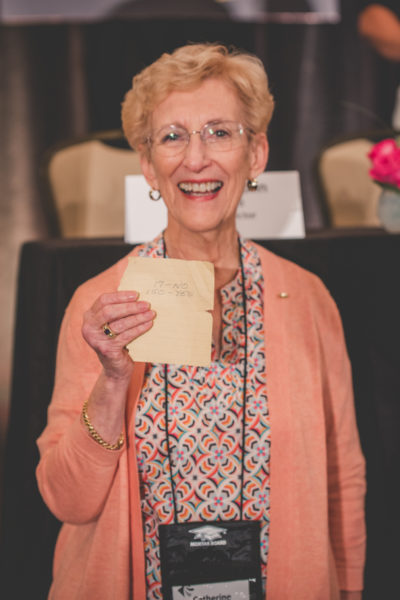
Catherine Evans at the 2018 Mortar Board National Conference holding the original vote count allowing men to join.
At 4:36 p.m. on October 19, delegates voted to extend Mortar Board membership to men. The vote was 150 – yes, and 17 – no. We heaved a sigh of relief. The vote was decisive and most of us were confident the right decision had been made. I think Dr. Barbara Cook’s Keynote Speech at the 1979 Conference sums it up eloquently: “Fortunately, unlike myself, it did not take a year of soul-searching for the collegiate delegates in 1975 to decide the fundamental issue in this debate. The delegates moved at last to open membership to all qualified students, and to affirm, in the Mortar Board preamble, a commitment to promote equal opportunity among all people. Yet, at the same time, they acknowledged that a historic and still significant principle of Mortar Board would continue to be that of emphasizing the advancement of the status of women. I remember leaving that Conference in 1975, thinking that if it were ever possible for men and women to enter into a full partnership, where there is equal respect for what our society deems masculine qualities and feminine qualities, Mortar Board is surely the place where this can happen.”
Finally I must add quotes from the January, 1976, Forum which headed with two excellent comments made by delegates. “Charles DeBois once said that at any moment we must be willing to sacrifice what we are for what we might become. In my opinion, the spirit of this conference could not have been more perfectly expressed. How fortunate we are to have been a vital part of history in the making!!” – Patty Payne, University of South Dakota. A quote from Jenny Johnson, University of Alabama said: “Now is the time for all good women to come to the aid of their fellow men.” Here are a few of many others in this Forum, no names attached, that I will share: “It is obvious to me from my involvement in the conference that some of the fears of being over ridden by men are unfounded. We, as women, have been much too strong.” “I voted ‘no’ on the resolution to admit men because of a real gut feeling that women still need Mortar Board as a single-sex honor society. However, I see this as our most logical recourse at this time and will work to implement it in any way possible.”
The next months were difficult and more public than I had anticipated. I was amazed at the local attention it received in radio and newspapers. Both the Dallas and Fort Worth newspapers interviewed me and a few area chapter members. Having nine Mortar Board chapters in Texas institutions may have sparked their interest. The reaction from Mortar Board alumnae ranged from incredulous to hostile to supportive. Telephone calls to me were almost constant, and in return a considerable number of letters were written explaining our Conference decision. Final ratification of the Constitutional amendments came in December by a vote of 135 chapters for and 32 against. Mortar Board now had an expanded purpose and a new clientele for membership. Institution Presidents were again written to notify them of our compliance with Title IX.
The final road on our Title IX journey was the 1976 Conference at Colorado State University in Fort Collins. On the first page of the Conference program was the Charles DuBois quote: “Sometimes we must sacrifice what we are for what we might become.” I think that was a guiding statement as we deliberated on our transition from a single-sex honorary organization to one including males. I must admit I was surprised there were 18 male delegates after the first tapping. They were involved from day one and contributed to our work. I would not be completely truthful if I did not say there was the normal boy – girl electricity in the room the first night. When the Conference began its work, this dissipated significantly, much to my relief. I left the Conference to go to a Lodge near Estes Park with our family. Ironically, it was the same place I had gone to my first Mortar Board meeting in 1963. I was reluctant to go as I was new, pregnant, and sure I would be the only one. Strangely enough there were two others – one a National Officer and one a RegionCoordinator. I never saw another pregnant woman at a Mortar Board meeting in the next 13 years!
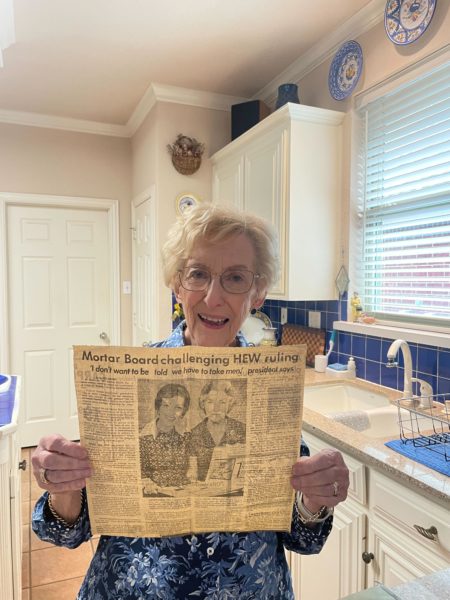
Catherine Evans at her home in Arlington, Texas in November 2022, 50 years after Title IX and her National Presidency.
My work with Title IX was done. As I write this article and reflect on all the effort that was spent during my 3 years of Presidency, I can only think – over and over – “how in the world did we do it?” How did a suburban housewife in Arlington, Texas, in her late 30s, manage a husband, an eleven year old daughter, a 9 year old son, graduate school classes 9 hours a semester, and then a thesis? My husband’s tolerance was critical; my public administration graduate school professors were helpful and supportive; and the most critical part of all was working in an organization like Mortar Board. The National Council members participated in the material we produced as did some of the Region Coordinators. In addition, Ruth Weimer Mount, President of the Foundation and my Mortar Board mentor was a higher education expert. Barbara Cook from Purdue University assisted with our work regarding sex discrimination. They were valuable assets to all our efforts. The glue that held us together was Donna Walls at the National Office. We did our work with typewriters on carbon copy paper, and an occasional telephone call, which was all we could afford. She put it together and mailed it out.
How in the world did we do it? For me, a visit in 1972 to the Mortar Board chapter at Emory University provided the gift of a mantra I frequently repeated those three years. The Chapter President suggested we go to the Emory Library and see a new exhibit of letters from Carl Sandburg to Ralph McGill (Editor of the Atlanta Constitution newspaper) written during the latter’s work in the civil rights activities of the 50’s and 60’s. As I walked along the tables of letters inside glass, I was very fortunate that my eye fell on a letter – and this was all it said: “When you wake up on any morning, be very slow about thinking that you are useless amid the present cross-roads of destiny.”
Our Title IX journey was over, and our cross-roads destination was determined.
Read an abridged version in the Autumn 2022 Forum.
